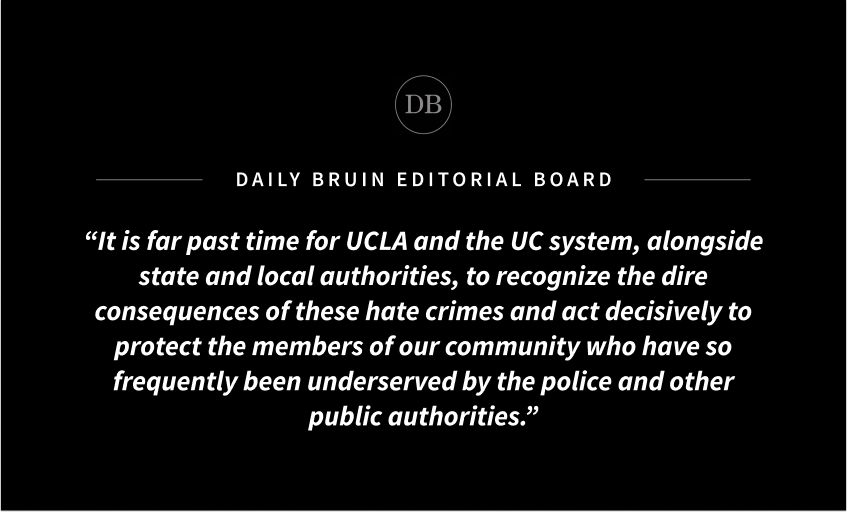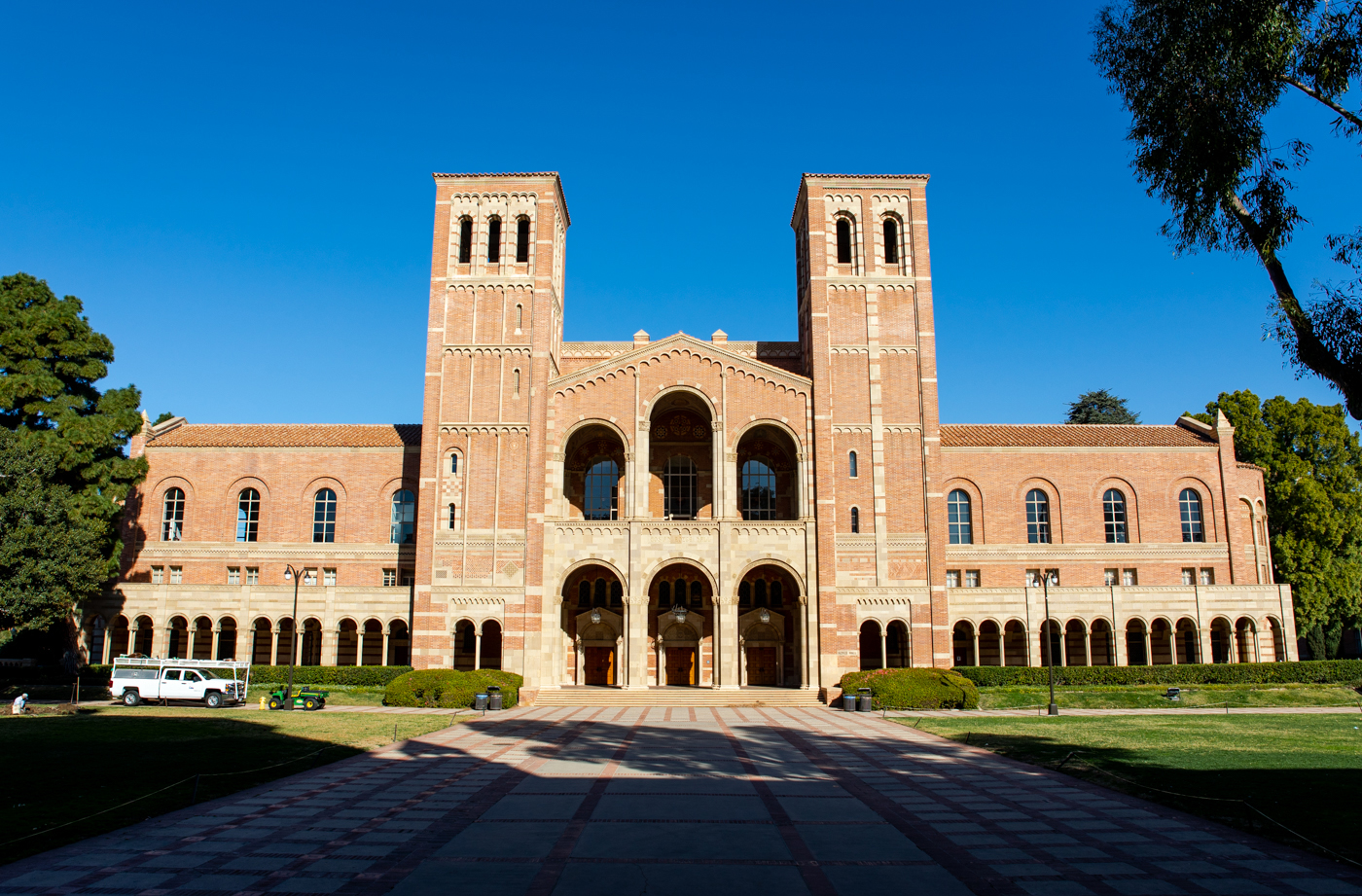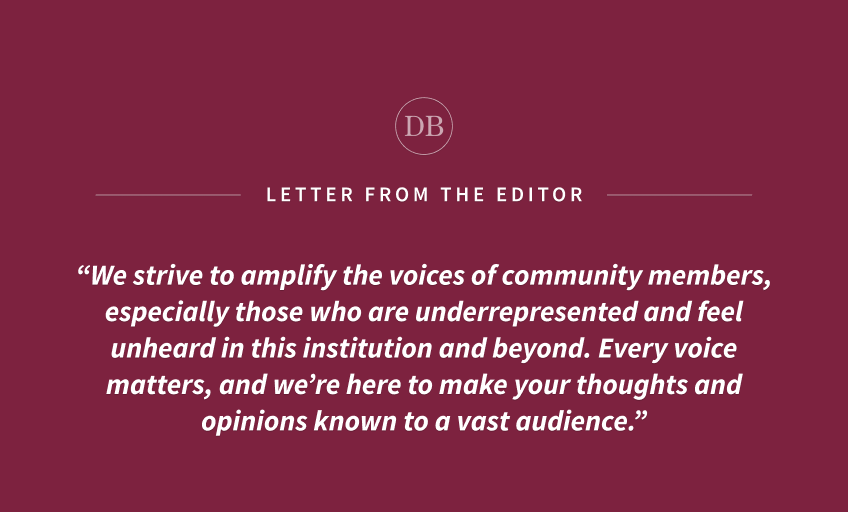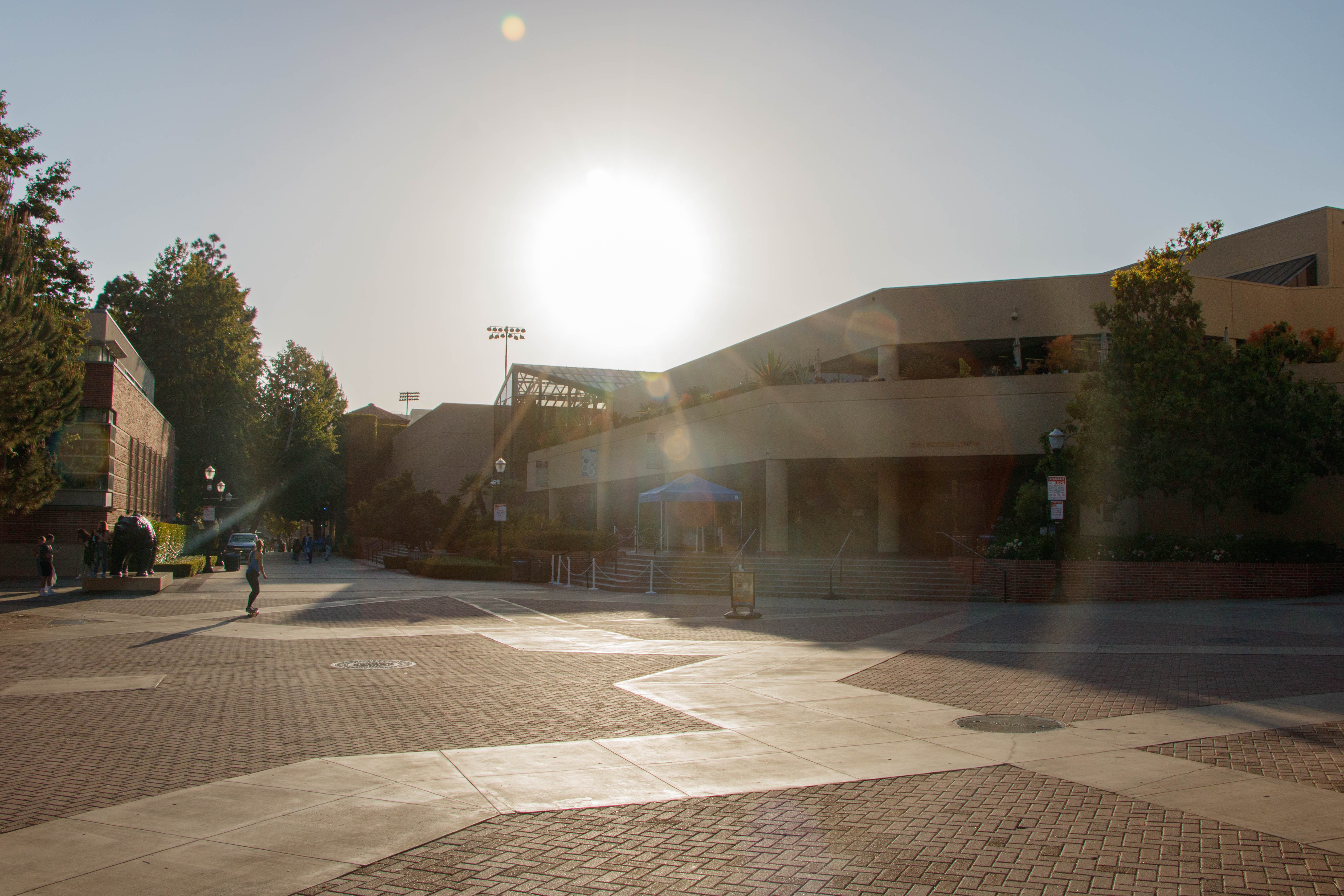Editorial: UCLA must prevent hate crimes, foster open environment for productive dialogue
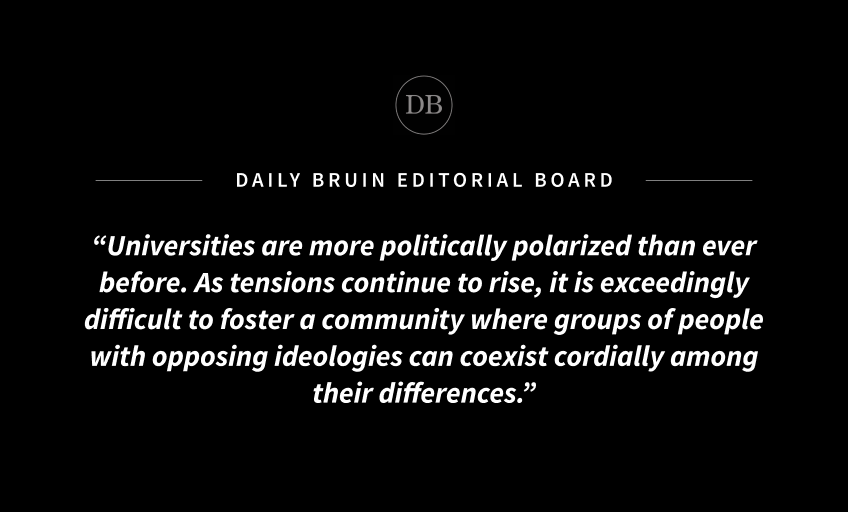
By Editorial Board
Feb. 12, 2024 8:02 p.m.
This post was updated Feb. 13 at 11:00 p.m.
College campuses should serve as safe spaces where students, faculty and staff from diverse backgrounds can come together, engage in critical open dialogue and express contrasting perspectives. But the threat of hate crimes makes this possibility far from the reality that many Bruins and academics across the nation are facing.
Universities are more politically polarized than ever before. As tensions continue to rise, it is exceedingly difficult to foster a community where groups of people with opposing ideologies can coexist cordially among their differences.
Freedom of speech and expression should not place an individual’s safety at risk. However, intense disagreement over sociopolitical conflicts has catalyzed violence and harassment in the form of alleged physical or verbal attacks, cyberbullying and doxxing, to name a few. Perpetrators of hate crimes tend to target individuals based on various identities, including race, religion, nationality, gender and sexual orientation. People advocating for change or participating in civic engagement are especially vulnerable as well.
After the Oct. 7 attack by militant group and Palestinian political party Hamas on southern Israeli villages and Israel’s ensuing military response on the Gaza Strip, hate crimes were reported to be at record highs in the United States, particularly against Jewish and Muslim communities.
In fact, antisemitic incidents increased by 337%, and Islamophobic incidents rose by 172%, according to data reported by CNN in December. It is essential to acknowledge that this data only reflects the hate crimes that were reported, failing to capture countless other incidents that victims may have remained silent about.
While hate crimes and hate speech are a global phenomenon, their impact is egregiously spreading throughout our own campus, as antisemitic and Islamophobic incidents have been overwhelmingly reported by students. As of December, UCLA has been under a Title VI investigation by the U.S. Department of Education to evaluate discrimination based on ethnicity.
Although the university has issued various statements intended to condemn the violence, UCLA must proceed vigilantly by implementing preventative measures against hate crimes rather than merely responding after the incidents occur. Failing to incorporate a proactive strategy to address discriminatory acts could result in grave consequences that place marginalized students at detrimental risk.
The creation of an official Hate Crimes Task Force would not only be beneficial to cultivating a safe campus community, but it would also be imperative to effectively ensure that skilled professionals are making informed decisions about how to avert violence along with imposing interventions when necessary. Robust communication is needed between the institution and community members to maintain consistent transparency.
As the No. 1 public university in the nation, UCLA’s No. 1 priority should be keeping students, faculty and staff safe at all costs.
Equity, diversity and inclusion cannot simply be a palatable phrase utilized by institutions, but rather an actionable mission. These core values cannot coexist with the infringement on freedom of speech, especially in an academic setting that thrives off the exchange of ideas, political discourse and debate to develop the next generation of leaders.
According to a 2021 report by the Foundation for Individual Rights in Education and other organizations, over 80% of college students across the nation said they censored their views at their universities. Moreover, 50% of students reported that racial inequality was a difficult issue to discuss on campus. Limiting the comfort of students and faculty to discuss sensitive topics in class diminishes their collective ability to become properly informed about complex issues and gain exposure to differing perspectives without vilifying the opposers.
Despite the common misconception that hate speech is not free speech, hate speech is, in fact, legally protected speech under the First Amendment. Nevertheless, it is vital for institutions to strongly condemn its use as harmful, dangerous and having the potential to escalate violent acts.
Students, faculty and staff of all identities and backgrounds deserve to feel safe on campus and should not have to navigate hostile environments, especially in their own classrooms. As faculty members’ calls for academic freedom are amplified across American universities, the dire need to preserve the right to express knowledge in an informative manner is one of pressing concern for the public good.
On Jan. 24, the UC Board of Regents proposed a policy that would ban publishing political statements on university websites after two ethnic studies departments publicly supported Palestine and condemned Israel. While the regents’ intention was to ensure that the opinions of individuals or faculty members are not viewed as representing the stance of the entire UC, this undermines the theoretical idea of a university in the first place: the sharing of diverse opinions for the sake of knowledge.
The facilitation of teach-ins and informational seminars should be encouraged in order to provide a safe space for community members to learn about particular issues with transparency and without judgment. Misinformation is a threat to democratic processes and far too common, as large waves of information are disseminated via social media platforms, news sites and political officials. Therefore, allowing students and faculty a forum to openly discuss issues from credible sources can promote a healthy learning environment.
Whether hate crimes are motivated by racism, classism, homophobia, transphobia or other forms of discrimination, there is one shared pattern that tends to trigger the act of violence.
Hate crimes often derive from dehumanization of “the other.”
Rather than seeing someone as an individual, perpetrators tend to generalize and view them through the lens of stereotypes that the victim’s community is subject to. Incorporating conflict mediation strategies that support the exchanging of quality discourse through active listening skills can promote understanding, accountability and healing for those involved on both sides, according to a 2023 report by the Stanford Law and Policy Lab.
While the university can undoubtedly ameliorate its current system of preventing and responding to hate crimes, it is also in the hands of community members to develop more compassion toward their counterparts and ways of treating those across the aisle.
This extends far beyond the confines of hate crimes at UCLA and reflects a much broader societal phenomenon of growing polarization. As we are currently in the midst of an election year, the urgency to exercise productive forms of expressing disagreements is important now more than ever.
As a campus community, it is essential to attack the argument and not the person.
UCLA has a long legacy of renowned and impactful social activists – from students to faculty – who have achieved groundbreaking strides for marginalized communities by advancing policy, research and civic engagement. To maintain a safe environment for individuals to advocate for what they believe in without fear of harassment, there must be a combined effort by the university to enforce preventative measures on an institutional level and by community members to develop more compassion for our peers on a personal level.
Our safety depends on it.



